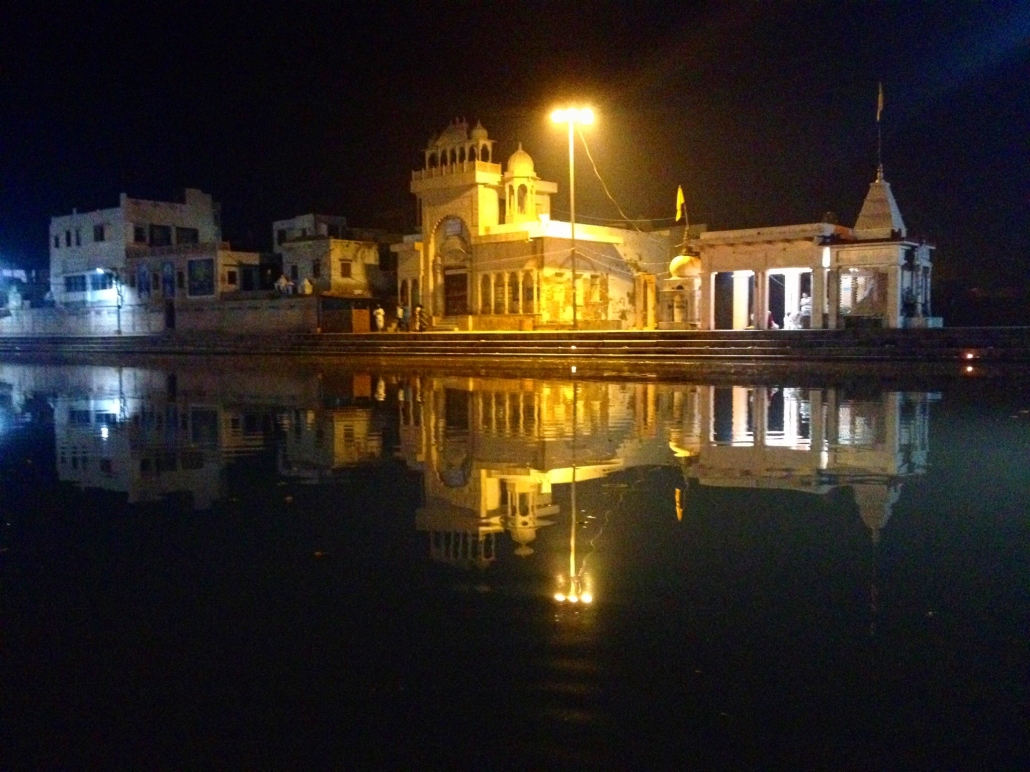Mahanidhi Madan Gopal Das
In his Sarartha Darshini tika (Srimad Bhagavatam 10.36.16), Srila Visvanatha Cakravarti describes the Radha-kunda appearance based on the following funny dialogue from the Vishnu Purana occurring after Sri Krishna vanquished the demon bull.
The innocent young gopis said, “Ah, Krishna, don’t touch us now, O killer of a bull! Alas, even though Arista was a terrible demon, still he was posing as a bull, who represents dharma.
“Thus You must undergo atonement, just as Indra did after killing Vrtrasura. You can purify Yourself of this terrible transgression by visiting every single holy place in the three worlds.”
Krishna: “Why should I travel throughout the universe? I will instantly call all the tirthas here and bathe in them. Just watch!”
Then Mukunda struck His left heel on the ground.
Within moments a miracle happened, and then Priyatama Syama said, “Bho Bho sakhis! Just see, the Patala Ganga from the subterranean realm has come here. Now I will command all the tirthas to follow her example.” Magically, all the sacred tirthas in the universe suddenly manifested right in front of Sri Krishna!
Proudly, Krishna then chided the gopis, “Just see My beloveds. Here are ALL THE TIRTHAS!”
The Vraja-gopis haughtily replied, “Sorry, we don’t see all those tirthas You’re talking about.”
Then each tirtha personified humbly identified themselves to Sri Radha and Her sakhis. They said, “I am the salt ocean. I am the ocean of milk. I am the Amara-dirghika. I am the river Shona. I am the Sindhu. I am the Tamraparni. I am Pushkara. I am the river Sarasvati. And we are the Godavari, Yamuna, Reva and the triveni of Prayaga. Just see our waters!”
After taking a purifying bath, Sri Krishna arrogantly challenged the gopis saying, “Bho, bho sakhis! I have produced a pond containing all the holy places, whereas you gopis have not done any pious acts to please Brahmaji”
Sri Radha said boldly, “I must create an even more beautiful pond than Krishna’s. Sakhis! Get to work!” In a ditch created by the hooves of the huge asura, the gopis started digging out a kunda with their golden kankana, bangles. Within an hour, the expert sakhis manifested a most majestic and beautiful divine kunda.
Completely astonished at their feat, Sri Krishna said, “O Priyaji! You and Your sakhis can fill Your lake with water from mine.”
“NO! NO! NO! Impossible”, said Radharani, “We cannot take Your water which is contaminated with the horrendous sin of killing a cow. I have unlimited sakhis who can easily bring billions of pots of pure water from Manasi Ganga. And thus the fame of My kunda will be unequalled!”
Bhagavan Sri Krishna then gestured to a celestial representative of all the holy places there. He arose from Krishna kunda, bowed to Vrshabhanunandini, and prayed to Swamini Radha with folded palms and tear-filled eyes:
“O Devi! Brahmaji, Shivaji and Lakshmi can never understand the fathomless depth of Your glories. Only Sri Krishna knows, and thus He humbly washes away Your perspiration when You are tired. And Krishna always thrills in delight whenever He gets the chance to wash Your beautiful lotus feet and fasten Your ankle bells. In fact, Shyama feels supremely fortunate simply by satisfying the tips the toes of Your lotus feet.
“It is on Krishna’s order that we have immediately come to live in this lake, created by one stroke of Krishna’s heel. Alas! The tree of our cherished desire will only bear fruit if You are pleased and grant us Your merciful glance!”
Sri Radha: “Well, then what do you want?”
In unison, all the sacred places said, “Our lives will be successful if we can come and fill the wonderful lake You have manifested. This is the only benediction we desire.”
With a side-long glance toward Shyama, Srimati Radharani replied to the sacred celestials: “Oh, certainly, please come!” Thus all the holy rivers and lakes in Sri Shyama-kunda forcibly broke through its boundary walls [at the Sangam} and swiftly filled Sri Radha-kunda with their waters.”
Sri Hari: “O Priyatama! On earth and throughout the universe, Your beautiful sweet Radha-kunda will be supremely more famous than Mine! Every day I will come here to bathe and enjoy water pastimes with You and all My preyasis. Indeed, Your beautiful Sri Kunda is as dear to Me as You!”
Srimati Radharani: “O Prana Priyatama! Even if You vanquish hundreds of Aristas here, I will still come and bathe every day in Your Krishna Kunda. Furthermore, I proclaim that anyone who bathes or lives here will attain intense devotion for My Sri Kunda, and become very dear to Me.”
On that full moon night [Caitra Purnima] in Radha Kunda, Sri Krishna and the Vraja-gopis enjoyed a maha rasa dance on the banks of Radha-kunda. When the Krishna cloud combined with the Radha lightning strike, their playful lilas flooded the three worlds with happiness,
krishna ambudah maha rasa harsha varsha, sri radhika pravara vidyud, trai lokya madhya vitati krta divya kirti!
Caitra Purnima Appearance Night of Radha-kunda ki jai! Jaya Jaya Sri Radhe!

